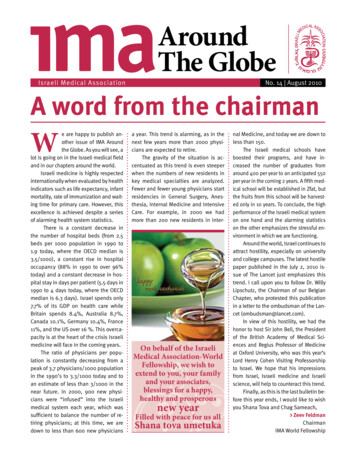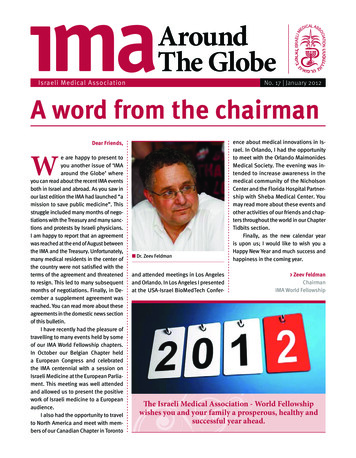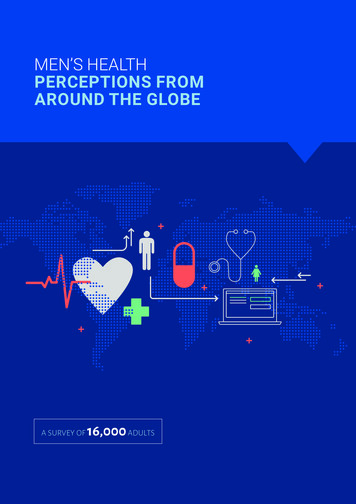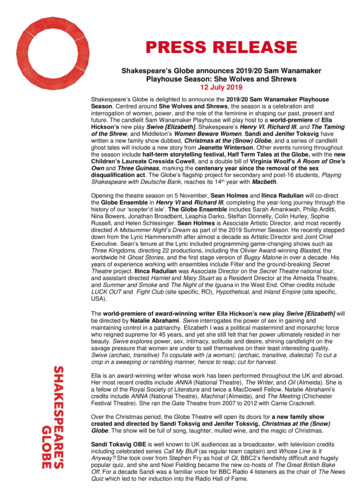
Transcription
Israeli Medical AssociationAroundThe GlobeNo. 14 August 2010A word from the chairmanWe are happy to publish another issue of IMA Aroundthe Globe. As you will see, alot is going on in the Israeli medical fieldand in our chapters around the world.Israeli medicine is highly respectedinternationally when evaluated by healthindicators such as life expectancy, infantmortality, rate of immunization and waiting time for primary care. However, thisexcellence is achieved despite a seriesof alarming health system statistics.There is a constant decrease inthe number of hospital beds (from 2.5beds per 1000 population in 1990 to1.9 today, where the OECD median is3.5/1000), a constant rise in hospitaloccupancy (88% in 1990 to over 96%today) and a constant decrease in hospital stay in days per patient (5.5 days in1990 to 4 days today, where the OECDmedian is 6.3 days). Israel spends only7.7% of its GDP on health care whileBritain spends 8.4%, Australia 8.7%,Canada 10.1%, Germany 10.4%, France11%, and the US over 16 %. This overcapacity is at the heart of the crisis Israelimedicine will face in the coming years.The ratio of physicians per population is constantly decreasing from apeak of 3.7 physicians/1000 populationin the 1990’s to 3.3/1000 today and toan estimate of less than 3/1000 in thenear future. In 2000, 900 new physicians were “infused” into the Israelimedical system each year, which wassufficient to balance the number of retiring physicians; at this time, we aredown to less than 600 new physiciansa year. This trend is alarming, as in thenext few years more than 2000 physicians are expected to retire.The gravity of the situation is accentuated as this trend is even steeperwhen the numbers of new residents inkey medical specialties are analyzed.Fewer and fewer young physicians startresidencies in General Surgery, Anesthesia, Internal Medicine and IntensiveCare. For example, in 2000 we hadmore than 200 new residents in Inter-On behalf of the IsraeliMedical Association-worldfellowship, we wish toextend to you, your familyand your associates,blessings for a happy,healthy and prosperousnew yearFilled with peace for us allShana tova umetukanal Medicine, and today we are down toless than 150.The Israeli medical schools haveboosted their programs, and have increased the number of graduates fromaround 400 per year to an anticipated 550per year in the coming 2 years. A fifth medical school will be established in Zfat, butthe fruits from this school will be harvested only in 10 years. To conclude, the highperformance of the Israeli medical systemon one hand and the alarming statisticson the other emphasizes the stressful environment in which we are functioning.Around the world, Israel continues toattract hostility, especially on universityand college campuses. The latest hostilepaper published in the July 2, 2010 issue of The Lancet just emphasizes thistrend. I call upon you to follow Dr. WillyLipschutz, the Chairman of our BelgianChapter, who protested this publicationin a letter to the ombudsman of the Lancet (ombudsman@lancet.com).In view of this hostility, we had thehonor to host Sir John Bell, the Presidentof the British Academy of Medical Sciences and Regius Professor of Medicineat Oxford University, who was this year’sLord Henry Cohen Visiting Professorshipto Israel. We hope that his impressionsfrom Israel, Israeli medicine and Israeliscience, will help to counteract this trend.Finally, as this is the last bulletin before this year ends, I would like to wishyou Shana Tova and Chag Sameach, Zeev FeldmanChairmanIMA World Fellowship
IMA AROUND THE GLOBE August 20102IMA Domestic News and ActivitiesPhysician Strikes:Interview withDr. Leonid EidelmanA major activity undertaken bythe Israeli Medical Associationin the last decade was a lengthy arbitration process designed to raise physicians’ salaries and implement reformsto their working conditions. Followingthe physicians’ strike in 2000, and inrecognition of the serious legal, ethical and financial costs of striking, theIMA agreed in July 2000, on behalf of allpublicly employed physicians, to giveup the right to strike for ten years in exchange for this mandatory arbitration.The arbitration process only began in2005, and in 2008 it was decided thatdoctors would receive a salary increaseDr. Leonid Eidelmanof approximately 23.5%; however noreal reforms on issues such as manpower and CME were realized.It is now 10 years since the agreement was made and Dr. Eidelman,President of the IMA, predicts that thesubsequent calm is due to come to acrashing halt. Last month in an interviewwith Haaretz, one of Israel’s leadingnewspapers, Dr. Eidelman discussedthe struggle that physicians in Israel arecurrently facing and highlighted the issue of strikes.Dr. Eidelmanwarned that thephysicians are preparedfor organizational steps,including striking”Dr. Eidelman explained that over thepast 10 years physicians have watchedas the government has skimped on workslots, investments in infrastructure anddoctors’ salaries. It now appears thatthe healthcare system is in a worsestate than it was before the arbitrationprocess began a decade ago. We arecurrently facing a physician shortage,with the ratio of doctors to the generalpopulation decreasing. The differencebetween what a doctor earns in Israelcompared to countries abroad has alsoincreased. Dr. Eidelman reported thatphysicians are disappointed that thegovernment dragged out the arbitration process for more than eight years,which meant that it was only possibleto effect one arbitration agreement. Theoriginal plan had been to execute manyagreements resulting in several wage
IMA AROUND THE GLOBE August 2010increases. Furthermore, the physicianshad to go to court to pressure the Finance Ministry to uphold the agreementthey made. This has resulted in poor relations between the physicians and thegovernment, which is not a good way tostart new negotiations.After the High Holidays the IMAwill begin new negotiations with thegovernment and Dr. Eidelman warnedthat the physicians are preparedfor organizational steps, includingstriking.IMA holds conference onmental health reformOn 7/7/2010 the IMA held ahalf day conference attendedby over 100 physicians, patients andrepresentatives of the government andthe health funds to discuss the proposed mental health reform currentlybeing discussed in the Knesset.The reform has three major components:1. Structural reform: The reductionof the number of beds in the psychiatric inpatient facilities and thetransfer of patients to ambulatorysettings.2. Insurance reform: Currently, psychiatric care is not included inthe health care basket of servicesprovided by the health funds, butrather is under the auspices of theMinistry of Health. Besides makingan arbitrary distinction betweenphysical and mental health, this results in the Ministry having to fightwith the Treasury each year for anincrease (unlike the basket of services which is updated by law) andunderfunding for these services.3. Rehabilitation reform: A law passedin 2000 was meant to provide resources for improving rehabilitation services in the community, but3these improvements were appliedinsufficiently or unevenly.The IMA supports the idea of mentalhealth reform, but wishes to ensure thatthere is proper infrastructure to absorbthe patients into the community setting, to allow flexibility in the amountand types of treatment offered anddiagnoses covered rather than a predetermined list set by law and to ensurethat the most vulnerable populationschildren and the elderly, who are notdiscussed in the new law-are not adversely affected. They also demand thatthe clinics currently operated by theMinistry not be closed.The IMA wants to assure seriousand comprehensive discussion ofthe proposed law before changes aremade.Dental Plan to be addedto the Health BasketRecently the Israeli High Courtruled on a petition submittedby the Israeli Medical Association (IMA),finding that the government’s decisionto finance dental care for children wasillegal. The dental program, first proposed by the deputy Health MinisterYa’acov Litzman last year, would makechildren up to the age of 8 years eligible for free dental treatment includingcheckups, x-rays, fillings, cleanings andextractions and with certain other procedures costing up to 20 NIS.The Court ruled that in order forthis program to be added to the statesubsidized health care basket of services, approval is required from theKnesset’s (Israeli Parliament) Labor,Social Welfare and Health Committeeprior to its being put forward in Cabinet.Dr. Leonid Eidelman, president of theIMA, expressed great satisfaction withthe Court’s decision. The IMA has continuously opposed the government’sThe IMA hascontinuously opposed thegovernment’s proposal totake NIS 65 million fromthe standardized healthcare basket in order tosubsidize the dental plan”proposal to take NIS 65 million fromthe standardized health care basket inorder to subsidize the dental plan, stating that the new program should not belaunched at the expense of other drugs.The IMA welcomed the decision by MPHaim Katz, the Committee chair, whoconfirmed that the dental programcould run on a provisional basis fromJuly 1 to November 30, at which pointit will be decided whether the programwill be renewed. The IMA supports thecontinued existence of the program, dependent upon a thorough examinationof the committee that the program iswell conceived and executed, and supported by adequate funding.Uruguayan Medical AssociationA delegation from the Uruguayan Medical Association (SMU),travelled to Israel last May in order tolearn about the Israeli Health System.The group included Dr. Julio Trostchansky (President); Dr. Martín Fraschini(Vice-President), Dr. Martín Rebella(Secretary) and Luis Lazariz Eq (Financial Advisor).The Uruguayan health system iscurrently undergoing a transformation,aiming to overcome a series of problems grounded in health care servicesand socio-economic issues. Publichealth authorities have driven the reform of the health system (SNIS) andhave consistently emphasized this bycomparing the Uruguayan experience
IMA AROUND THE GLOBE August 20104with that in place in Israel. Similaritiesbetween the two health systems areevident from the decision to concentrate funding through social insuranceand reimbursement to providers basedon the calculation of risk-adjusted premiums for the covered population. Furthermore, in Uruguay they often hearabout the benefits of the Israeli healthsystem as a whole.The Uruguayan delegation begantheir trip with a visit to the Israeli Medical Association where they met with several representatives from the board andScientific Council. They also met withrepresentatives from the Israeli Ministryof Health, Mashav (Israel’s agency forInternational Development Cooperation), and the Uruguayan Embassy.The Uruguayan professionals wereable to hear the views of doctors inIsrael and see how the system worksin a practical sense through visits to arange of hospitals and primary healthclinics across Israel. During their visit toHadassah Hospital they met with ProfAvi Israeli the head of the Health Policy,Health Care Management and HealthEconomics Department at the HebrewUniversity.At Rambam hospital, in addition tovisiting the departments related to theirspecific specialties, the delegation visited the trauma unit and teaching centerfor trauma emergency and mass casualtysituations and ended with a tour of theemergency and trauma unit. The grouplearnt about Clalit Health services, thelargest health fund in Israel, duringtheir visits to Rabin Medical Center andthrough a tour of the South where theyThe Uruguayanprofessionals were ableto hear the views ofdoctors in Israel and seehow the system works”visited primary health clinics in Bedouinvillages ending at Souroka Hospital.It is believed that this visit was notonly beneficial to the Uruguayan Medical Association in teaching them aboutthe Israeli Health Service, but also allowed the Israeli Medical Association tolearn from their Uruguayan colleaguesand discuss common practices andproblems.Sir John Bell Delivers theLord Cohen VisitingProfessorship LectureProf Sir John Bell is Presidentof the Academy of Medical Sciences and Regius Professor of Medicine at Oxford University. He trained inmedicine in Oxford as a Rhodes Scholarand then at Stanford University wherehe developed research interests in immunology, genetics and genomics, witha particular focus on susceptibility toautoimmune diseases.The Lord (Henry) Cohen Visiting Professorship to Israel is a joint annual initiative funded by Hadassah UK/ BritishFriends of the Hebrew University/ JewishMedical Association (UK). The VisitingProfessor is selected as a leading member of the medical profession from theUK and is taken on a tour of the majormedical institutions in Israel, meetingthe leading doctors and researchers atthose institutions. On return to the UK, akeynote lecture is delivered at the Annual General Meeting of the Jewish MedicalAssociation UK on a specialised subject,which can draw on the Prosessors experiences and conclusions that arose fromhis or her visit to Israel.Sir John Bell’s lecture was entitled“Personalised medicine - when will ithappen?” He introduced the subjectby explaining how the study of humangenetics and the genomic mapping ofindividual patients would enable us toSir John spokewarmly of his packed visitto all of Israel’s majormedical institutions”match therapeutics to pathophysiology in the future. For complex diseases,where many genes are involved, the genetic mapping work is already enablingus to explore novel metabolic pathwaysand explain the way that different medicines work in different people. Sir Johngave several examples of the way thatrecent medical developments have already had a major impact on health care.Development of anti-psychotic medicinehave led to the closure of psychiatric inpatient units, biological therapies havechanged the natural history of rheumatoid arthritis; and genetic and molecularstudies have enabled us to ensure thatonly those people whose tumours willrespond to Herceptin receive treatment.Sir John spoke warmly of his packedvisit to all of Israel’s major medical institutions, where he met with biomedicalscientists, clinical academics and theheads of several Universities and Institutes. He visited Hadassah / HebrewUniversity, Weizmann Institute, ShaareiZedek Hospital, Ben Gurion University,Sheba Medical Centre and the Technion.Accompanied by his wife and children,Prof Bell also had an opportunity to seehistorical and cultural sites in Israel,and at the home of British Ambassadorhe met, inter alia, with the newly appointed Director General of the IsraeliMinistry of Health and with the President of the Israel Medical Association.Sir John’s conclusions were that:1. Israel has amazing strength inground breaking research, despitethe lack of local funding.2. The number of centres of excellencewas remarkable for such a smallnation.
IMA AROUND THE GLOBE August 2010The Israeli lead in technologicalcommercialisation in medicine andpharmaceuticals was somethingwhich the rest of the world couldlearn from them.4. There was a very strong commitment to translational research, fromlaboratory bench to patient.Sir John looked to the future for two developments: there needs to be more,and stronger, fellowships and studentexchange programmes between Israeland the UK, and based upon the number of centres of medical excellencein Israel today, he believed that it wastime to create an “Israel Genomics Institute” which would ensure that theleading groups were encouraged towork more closely together. If Israelcould develop such an Institute he feltthey would be world leaders in thisfield, which he feels is the real medicine of the future.53.Dr. Eidelman and Dr. Leon Cohen BelloDr. Leon Cohen Bello visitDr. Leon Cohen Bello, Chairman ofthe IMA Argentinean Chapter, travelled to Israel to attend the InternationalConference on Bioethics Education: Contents, Methods, Trends, which was held inZefat last May. During his time in Israel, Dr.Bello was welcomed by the Israeli MedicalAssociation and met with Dr. Eidelman,President; Dr. Rahamimov, Vice-President; Leah Wapner, Secretary General; Dr. Feldman, IMA World Fellowship Chairman andDr. Erdman from the IMA WF board.The IMA was to happy invite Dr.Bello for dinner, where they were ableto discuss the work of the ArgentineanChapter as well as medical ethics inboth Israel and Argentina. Dr. Bellopresented the IMA representatives witha CD from the Argentina Medical Association which contained their Code ofEthics. We hope Dr. Bello enjoyed histime in Israel and will return again.From left to right: Dr. Leon Cohen Bello, Dr. Erdman, Dr. Eidelman, Adv. Wapner,Dr. Rahamimov, Dr. FeldmanThe IMA was to happy invite to Dr. Bello fordinner, where they were able to discuss the work ofthe Argentinean Chapter and also medical ethics inboth Israel and Argentina”
IMA AROUND THE GLOBE August 20106IMA International ActivitiesDr. Eidelman with representatives of the Korean Medical AssociationDr. Eidelman’s visitto South KoreaDuring a trip to South Korea lastmonth, Dr. Eidelman, presidentof the IMA, met with delegates of boththe Korean Medical Association andKorean Hospitals Association. To startthe day, Dr. Dong Chun Shin (Chair,Executive Committee of InternationalRelations at the Korean Medical Association) arranged a tour of Yonsei University Severance Hospital. The SeveranceHospital of the Yonsei University HealthSystem is the second largest universityhospital in South Korea and is the oldestwestern-style hospital in the country. Itwas founded in 1885 by Dr. Horace N.Allen, an American missionary doctor.Severance Hospital manages theCancer Center, Rehabilitation Hospital,Cardiovascular Hospital, EYE & ENTHospital, Child and Adolescent Clinic,Emergency Care Center, Diabetes Center, Allergy Clinic, and Stroke IntensiveCare Unit. Dr. Eidelman enjoyed a veryinformative tour of the hospital’s impressive departments and met withmany of its physicians along the way.Dr. Eidelman then had the pleasureof meeting with Dr. Man Ho Kyung, President of the Korean Medical Association(KMA) and Dr. Tai Joon Moon PresidentEmeritus of KMA, Former President ofthe World Medical Association andKMA and former minister of health andwelfare of Korea. They were able to discuss current problems which affect bothhealth systems and medical associations in South Korea and in Israel.Finally, Dr. Eidelman met with representatives from the Korean HospitalsAssociation (KHA). The main missionof the KHA is to guarantee high qualitymedical care to the public by improvinghospital facilities and services. Since itwas founded nearly half a century agoon July 2nd, 1959, the KHA has beenleading the efforts to upgrade publicmedical care and further advance thehospital industry.The key functions of the KHA include such hospital development projects as hospital management surveysand analyses, hospital policy research,prevention and mediation of medicalmalpractice cases, among others. Inaddition, the KHA hosts a wide rangeof on-the-job programs and seminars totrain resident doctors and improve thequality of medical services.Dr. Eidelman had the opportunity tomeet and share ideas and experienceswith physicians from the other side ofthe world. He was able to spend time
IMA AROUND THE GLOBE August 2010learning about both associations andgain a greater insight into the KoreanHealth Care system. Dr. Eidelman statedthat: “No level of correspondence cansubstitute for the experience of visitinganother’s country and viewing the otherhealth system from within. As they say,a picture is worth a thousand words.”Dr. Yoram Blachar presentsthe Boniuk-Tanzman Lecture atWashington UniversityIn late April this year Dr. Blachar(Past President of the IMA) wasinvited to Washington University in St.Louis to give the Boniuk-Tanzman lecture on Jewish Medical Ethics. This lecture is dedicated to the memory of Mr.Hyman Boniuk for his concern for people and Jewish thought, and Dr. JosephTanzman for his dedication to the propagation of Jewish ethics in the practiceof medicine. It is also held in memoryof Rachel Boniuk and Cecelia Tanzman,the women of valor behind these twodedicated men. Dr. Blachar was the 26thBoniuk-Tanzman Lecturer. His threemost recent predecessors were: Avraham Steinberg, M.D.Director, Center for Medical Ethics,Hebrew University-Hadassah Medical School Fred Rosner, M.D., F.A.C.P.Former Director of the Departmentof Medicine, Queens HospitalCenter and Professor of Medicine,Mount Sinai School of Medicine Michael A. Grodin, M.D.Professor of Health Law, Bioethics,and Human Rights, Boston UniversitySchool of Public Health and Professorof Socio-Medical Sciences, Community Medicine and Psychiatry, BostonUniversity School of MedicineAt the Boniuk-Tanzman Lecture, theaudience was made up of physiciansand faculty members of Washington7University. Dr. Blachar delivered a presentation titled: “Israeli Medicine in theMedia: Reality, Politics or Prejudice”. Inthe course of the presentation, he demonstrated how information is not alwayspresented objectively, especially in themedia, and certainly not when Israel isinvolved. Dr. Blachar highlighted howthe media can be ruled by economicinterests and sensationalism sells! Inaddition, there is often a hidden, political agenda which can result in anuntenable mix of politics and medicine.Dr. Blachar presented aspects of themedical reality in Israel and showedsome of the problems in the way this ispresented by the media.The next day Dr. Blachar met withmedical students at Washington University Medical School where he de-he demonstratedhow information isnot always presentedobjectively, especiallyin the media, andcertainly not whenIsrael is involved”Dr. Yoram Blacharlivered a lecture on the World MedicalAssociation titled: “World Medical Association: Mission and Vision for theFuture”. The lecture was followed bya question and answer session and alively discussion.During his time in St Louis, Dr.Blachar also had the opportunity tohave dinner at the Hillel of St. Louis,next to Washington University Campus.Jewish medical ethics conferenceDr. Zeev Feldman, IMA-WF chairman, and I spent a wonderfulfour days at the JMEC in Stoos, Switzerland, sponsored in part by the IMA-WFSwiss Chapter.The conference itself was held in alovely hotel nestled in the picturesquemountains overlooking Lake Lucerne-orso we were told. Four days of rain andsnow kept us inside for a fascinatingprogram but will necessitate a returntrip to the area to enjoy the scenery.The program-focusing on the themeof “The Human Mind in Crisis” – was diverse and informative and included lectures by physicians, psychologists and
IMA AROUND THE GLOBE August 20108The programfocusing on the themeof “The Human Mind inCrisis” was diverse andinformative and includedlectures by physicians,psychologists and rabbis”Social activies at the JMEC conferencerabbis, among others. Individual casestudies, Jewish sources and unusualethical dilemmas added to the interestof the sessions.Along with the scientific program,we were treated to wonderful Klezmermusic, a Swiss night replete with traditional Swiss food and music and thepleasure of meeting health professionals from all over the world.I’d like to thank our hosts, RafaelGuggenheim and Willy Lipschutz of theSwiss Chapter for their Swiss hospitality.We can’t wait for the next conference! Malke Borowand attend the conference: LACA - LatinAmerican Congress of Autoimmunity.Prof. Shoenfeld arranged for this to beheld in the Argentine capital, with 600physicians and scientists from aroundthe American continent in attendance.Prof. Shoenfeld’s visitin ArgentinaOn 29.6.10 Prof. J. Shoenfeld,the editor of the IMA publications “HAREFUA” and “IMAJ”, and headof the department of Interial Medicine‘B’ at Sheba Medical Center, met withmembers of the Argentinean chapterin Buenos Aires. The purpose of hisvisit to Buenos Aires was to organizeprof. ShoenfeldDuring his visit, Prof Shoenfeld discussed Israeli relations with the membersand, in particular, the work of the “Federico” Foundation program, for which he isa consultant. The “Federico” Foundationprogram works to bring Latino doctorsand scientists to Israel. So far, Prof. Shoenfeld has recruited eight doctors fromMexico, Ecuador, Argentina, Brazil andColombia. In the near future an additionaltwo doctors from Brazil and Argentina willtravel to Israel to work at the Zabludowicz center for Autoimmune diseases atSheba Medical Center.Prof. Shoenfeld was granted honorary membership by the Argentineanchapter.
IMA AROUND THE GLOBE August 20109Cross Border MedicineDOCTORS AGAINST RACISM AND ANTI-SEMITISM (DARA)We have all read with admiration in these pageswith HonestReporting.com and disseminated emails tothe work of the Israeli physicians and allied prothe membership encouraging them to write letters to thefessionals who travelled to Haiti on a humanijournal. After receiving over 200 letters, the editor of thetarian mission following the devastation of the recent earthjournal engaged DARA in an hour-long discussion aboutquake. From lives saved in state of the art field hospitals, tothe biased nature of the articles. The editor kept to histhe work of search and rescue teams, Israel’s contributionword of publishing a piece highlighting one of Israel’shas been exemplary.favourable medical contributions (Save a Child’s Heart)If one, however, were to believe much of what has beenand promised to be more objective in selecting futurecirculating on the Internet and in the blogosphere, the realarticles for publication.reason Israel sent its delegation was to secretly steal the or2. DARA members have attended anti-Israel medical lecgans of Haitians and sell them for profit.tures on University campuses to challenge the one sidedSuch statements should come as no surprise. In the pastview of the speakers. This often led to verbal assaults onfew years, there has been a dramatic, global resurgence ofthe DARA members in attendance. This atmosphere of inanti-Semitism. What is somewhat surprising is that it fretimidation has led to high level meetings between DARAquently emanates from academics, who often disguise theirand University of Toronto administration to implementhatred for Jews in the form of irrational, disproportionate, andmechanisms whereby University events would be free ofvocal criticism of Israel.harassment and intimidation.Unfortunately, this form of anti-Semitism has found its3. DARA organized a Royal conference in October 2009way into medicine and the medical literature.titled “The Medical & Psychological Impact of Terrorism”.In response to a highly biased piece of anti-Israel proSpeakers included specialists from Pakistan, Afghanipaganda disguised as medical literature in the Lancet, astan, Israel and Canada. The Royal College of Physiciansgroup of physicians and dentists in Toronto, Canada formedand Surgeons of Canada approved the conference fora group to combat racism and anti-Semitism in medicine andCME credits.academia in March 2009. Doctors Against Racism and Anti4. DARA spear-headed and very actively supported a counSemitism (DARA) was born.ter-petition to prevent the removal of the WMA presidentCurrently numbering over 500 members around theDr. Yoram Blachar.world, DARA is a grassroots organization of health care pro5. DARA has been very active in the counter boycott of Isfessionals whose activities are directed at opposing racismraeli physicians.and anti-semitism in the medical realm specifically and acaAfter it came to DARA’s attention in November 2009 that ademic environments generally. It seeks to ensure that medicalCME conference sponsored by the Ontario Medical Associapublications maintain the stantion (OMA) was to take place indards of verifiability expectedDubai (thereby disallowing enDARA is a grassrootsof scientific literature in avoidtry to Israeli physicians), DARAorganization of health careing promulgation of subjectivenotified the OMA and the sponprofessionalswhoseactivitiesarearticles aimed at vilifying anysorship was cancelled.directed at opposing racism andrace, nation or country.In November 2009, Israelianti-semitism in the medical realm” physicians and scientists wereIn the past year and adisallowed entry into Egypt tohalf, since the not-for-profitparticipate in a regional Breast Cancer Conference. Aftergroup was formed, much has been accomplished.discussions with the organizers, assurances were given to1. In response to an ostensibly anti-Israel article in the CaDARA that the Israeli delegation would be allowed to parnadian Medical Association Journal, DARA teamed up
10IMA AROUND THE GLOBE August 2010delegates is not prohibited on the basis of nationality, race,ticipate. Unfortunately the decision came too late to affectreligion, sexual orientation, and other xenophobic criteria.their attendance.DARA is not an Israel advocacy group. Where there isAfter it came to DARA’s attention that an Internationalracism and anti-Semitism, DARA, as part of its mandate, willAnesthesiology conference was to take place in Dubai, DARAget involved. For example, DARA endorsed the “Save the Doccontacted American sponsors of the meeting, who subsetors” campaign, encouraging due process of law for two Sriquently withdrew sponsorship.Lankan physicians held without trial in Sri Lanka.DARA was involved in high level discussions with theDARA continues to monitor the literature, fight boycottsorganizers of the International Society of Thrombosis and Heof physicians, and aremostasis in May 2010,planning a second conafter several Israeli phyDARA is currently involved in anference on the humanisicians were disallowededucation campaign targeting Internationaltarian contributions ofinto the Internationalmedical societies, encouraging them tovarious countries in themeeting i
ment was made and Dr. Eidelman, President of the IMA, predicts that the subsequent calm is due to come to a crashing halt. Last month in an interview with Haaretz, one of Israel's leading newspapers, Dr. Eidelman discussed the struggle that physicians in Israel are currently facing and highlighted the is-sue of strikes.










